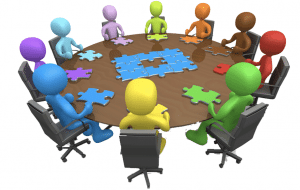 Perhaps the most important part of project management is that of control. Once the decision has been taken to launch and implement a project, the project manager must assume the responsibility for ensuring that each person involved completes their assigned tasks in order to thereby guarantee that the project runs according to plan.
Perhaps the most important part of project management is that of control. Once the decision has been taken to launch and implement a project, the project manager must assume the responsibility for ensuring that each person involved completes their assigned tasks in order to thereby guarantee that the project runs according to plan.
The concept of project control is very simple: a project is created with certain targets after studying the resources available and drawing up a schedule to reach those goals. Control is what ensures oversight of these plans, ensuring that no team member deviates from the course set. The completion of control-related tasks will ensure achievement of the targets as they were defined in the planning stage.
After planning a project, it is recommended to implement a control system. The main requirement to begin with will be for the project to be fully defined and approved by the steering committee or shareholders’ meeting and, as appropriate, by the sponsor of the actions to be carried out.
These lines of action will indicate the costs, the scope for the project and the schedule to be followed for meeting the targets:
-
Cost base: this specifies the costs to be incurred by the project, with a distribution over time that will be coherent with completion of the tasks over time. This is very useful when wishing to compare estimates with actual cost.
-
Schedule base: a timeline with the targets set for each stage of the project will be created.
-
Scope base: formed by the various activities that comprise the project and that will enable the deliverables to be produced. All this is reflected in the WBS that was approved. The scope base allows the progress of each activity and each deliverable to be known.
Once these baselines are defined, it is time to get to work on project control. Of course, it is very important to consider certain factors when doing so.
-
Scope: This will control the tasks that should be carried out by each member of the project and that the result meets the requirements initially stipulated. Whenever a task fails to meet these requirements, it is considered as incomplete.
-
Deadline: Within project control, it is essential to monitor compliance with agreed deadlines. It should be noted at this point that the first schedule is drawn up without considering a margin for risks. This is because if these margins were to be considered at that point, they would end up being used to cover other issues that are not strictly considered as risks.
-
Cost: Two factors require control in this regard: the total cost of the project and treasury control.
-
Risks: It is important to keep risks under control because, in the event of an unforeseen eventuality, this will have an immediate effect on the achievement of project targets.
Professional help for projects: Being able to undertake large-scale projects and fully control them is a process that can sometimes prove rather complicated. It is therefore necessary to have software such as ITM Platform that incorporates the flexible management methods used by major corporations into your company. It is a great tool that will facilitate project implementation and delivery within established deadlines, and that offers advanced solutions to business.
